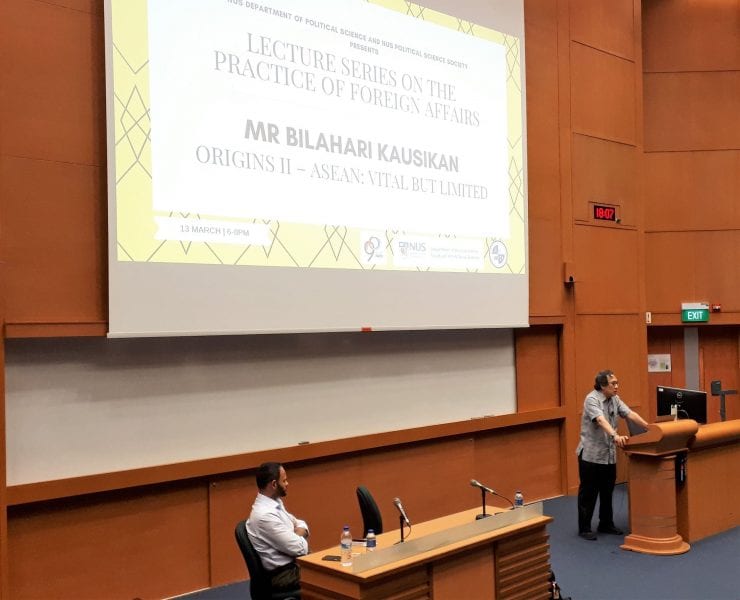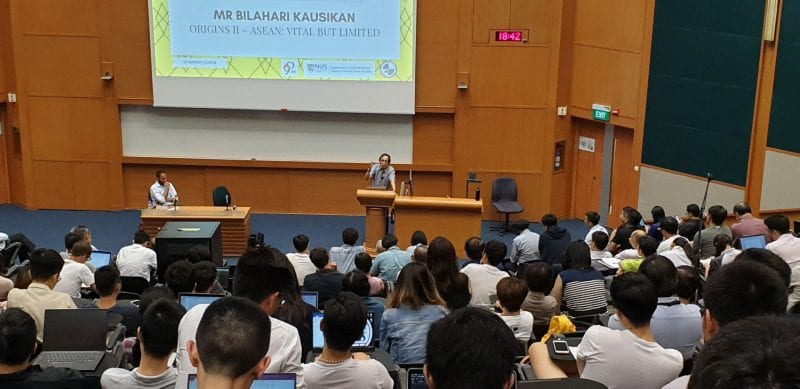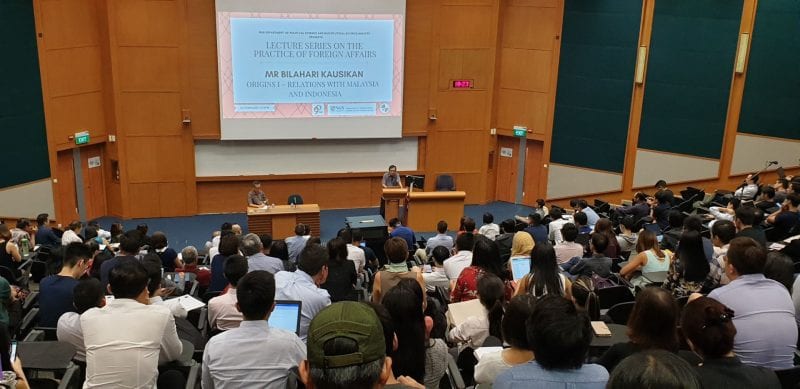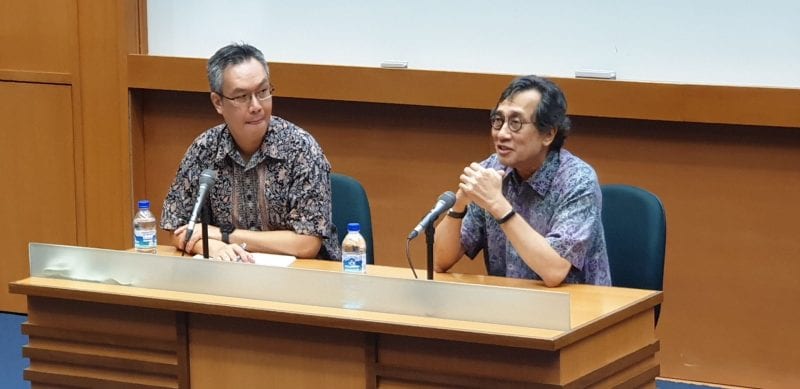From February to April 2019, Mr Bilahari Kausikan (Arts and Social Sciences ’76) delivered five lectures as part of the FASS90 Political Science Lecture Series on the Practice of Foreign Affairs. He introduced more than a thousand attendees to statecraft, sharing insights on the current state of international relations in South-East Asia and the world.
Foreign policy and diplomacy are inherently complex and nuanced. His first four lectures broadly focussed on foreign policy: how it is enacted between sovereign states; how Singapore manages bilateral relations with its neighbours; the Association of South-East Asian Nations’ (ASEAN) role in the region; as well as the role external powers such as the United States and China play in South-East Asia. His final lecture addressed the way forward for Singapore. Kausikan summarised its future challenges in three distinct lessons:
- Why it is important to have more than a superficial understanding of foreign affairs?
- The need for red lines in interstate relations and why governments need to enforce them?
- The importance of maintaining communication with other states at all times, even during periods of hostility.
Complexity of Foreign Affairs and the Dangers of Oversimplifying
The central theme of his fourth lecture on US-China relations was how international diplomacy is an intricate affair. A recurring message through Mr Kausikan’s lectures was how foreign policy usually does not conform to easily understood summaries and narratives. He was particularly keen to dispel the notion that contemporary US-China relations are similar to that of US-Soviet relations during the Cold War.
Gone are the days of a bipolar world where every state “defines their interest in relation to this binary structure,” he emphasised during his global superpowers lecture. The United States and China are far more intertwined than the United States and the Soviet Union ever were. By far, there are far more significant regional players and factors on the global stage to be considered. In particular, he dismissed the idea that America and China were locked in a zero-sum game, where any advance made by China entailed a corresponding decline in American influence.
He expressed how over-simplified narratives like this could hinder a country’s foreign policy plan. If the general public only had a superficial understanding of foreign affairs, they would be far more likely to pressure their governments to revise policies in a manner which may cause harm as they simply did not know any better. During his final lecture, Mr Kausikan strongly advocated for a ‘foreign affairs literate’ population to prevent this from happening in Singapore.
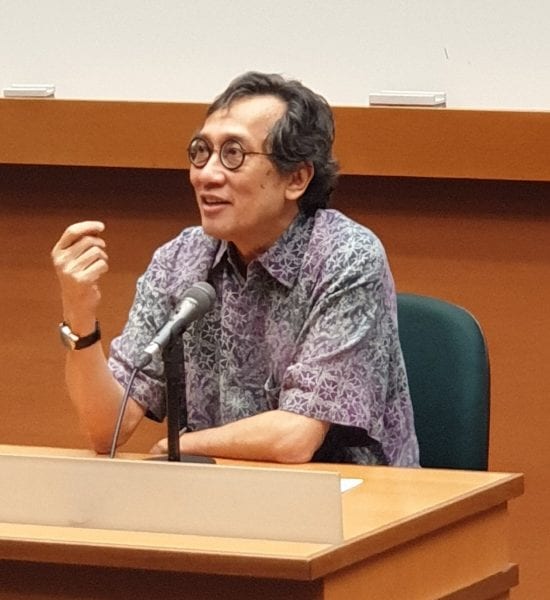
The Red Lines and Enforcing Them
Another recurring theme was that Singapore must not be afraid to act if its core national interests are threatened, even if it means standing firm and holding ground against larger states. Mr Kausikan said Singapore, or any sovereign state requires two steps to convey this. The first is to establish clear ‘red lines’, uncrossable boundaries which if violated, have clear, known consequences. He shared numerous examples of these uncrossable red lines. In his second lecture, he discussed the possibility of Malaysia removing its water supply to Singapore, or Taiwan declaring independence from China with America’s support in his fourth lecture.
The second is ensuring the state has the means and political will to enforce these red lines, should they be crossed. A violation of either example could result in drastic measures including military action. Follow through is paramount, Mr Kausikan emphasised on multiple occasions throughout the series; effective deterrence is impossible if the other party senses you are unwilling to back your stand. Failing to support these red lines with action would significantly damage the state’s credibility and prestige, making red lines harder to establish and enforce in future.
Maintaining Open Dialogue Between States
Whilst red lines are important, Mr Kausikan was quick to emphasise continued communication and cooperation between states was crucial to upkeep good relations, especially during periods of hostility. More significantly, states had to be able to set aside differences and work together when their interests coincided. As an example, he highlighted continued cooperation between the law enforcement agencies of Singapore, Malaysia and Indonesia to address cross-border terrorism, even during periods of frosty relations between nations.
Singapore and the Future
With that, Mr Kausikan ended his series, nobly contributing to the cause by educating the Singaporean population on foreign policy and diplomatic relations. Through intellectual debate and rigour he ensured the public understood the need for red lines and its potential enforcement, as well as, the importance of quality communications in bilateral relations. In an increasingly complex and unpredictable global climate, Singaporeans should strive to remain united and informed if it wants to continue prospering. Most importantly Mr Kausikan said, we cannot be afraid to take risks as, “Sometimes, trying to avoid risk is the riskiest option of all.”
—-
Synopsis, lecture posts and videocast available via the links below:
Lecture One: How to Think about Foreign Policy?
30 January 2019
The first lecture situates the fundamental role of national interests in foreign policy. Why are Singapore’s national interests not better and more widely understood? The talk examines some common errors in thinking about foreign policy, as well as the creation and maintenance of relevance for a small city-state, and why small countries should not behave like small countries.
Lecture Two: Origins I – Relations with Malaysia and Indonesia
20 February 2019
The second lecture conveys the inevitable complexity of relations with Singapore’s neighbours. It provides an overview of the systemic origins of bilateral tensions with our neighbours, focusing on the uses and abuses of history, and the roles of ‘baggage’ and personality. The talk ends with thoughts on how Singapore could manage complexity and cope with competing nationalisms with our neighbours.
Lecture Three: Origins II – ASEAN: Vital but Limited
13 March 2019
The third lecture discusses the origins of regionalism in Southeast Asia. It explains the necessity but also the limits of ASEAN. The talk will suggest that ‘it is pointless to criticise a cow for being an imperfect horse’.
Lecture Four: The New Global and Regional Strategic Context
20 March 2019
The fourth lecture looks at the key factors driving change in the global and regional order. Issues to be explored include: the nature of US-China relations, coping with competing influences, the roles of Japan, India, Australia, Russia and the EU. The talk also offers thoughts as to why the future of East Asia will be multi-polar.
Lecture Five: Future Challenges
3 April 2019
The final lecture in the series examines the interaction of foreign policy and domestic politics. It offers thoughts on how to manage uncertainty and emerging systemic vulnerabilities in Singapore.
—
About the Speaker
Bilahari Kausikan is Chairman of the Middle East Institute, NUS. From 2001 to 2013, he was first the second Permanent Secretary and then Permanent Secretary of the Ministry of Foreign Affairs (MFA). He was subsequently Ambassador-at-Large until May 2018, having previously served in various MFA appointments, including as the Deputy Secretary for Southeast Asia, the Permanent Representative to the United Nations in New York and as Ambassador to the Russian Federation.
FASS90 Political Science Lecture Series on the Practice of Foreign Affairs
This five part lecture series is organised by the NUS Political Science Society with support from the Faculty of Arts and Social Sciences (FASS) and the Department of Political Science. Established in 1929, FASS, one of the earliest and largest faculties is celebrating its 90th anniversary this year. Whilst witnessing numerous changes, we remain steadfast to our vision to strive forward as a premier faculty of excellence in humanities and social sciences that nurtures tomorrow’s engaged, thoughtful and creative global citizens. To mark this occasion, the Faculty is organising a series of events showcasing the strength and breadth of the Faculty’s research as well as kick start future initiatives that would benefit the generations of students who will come through our halls.






